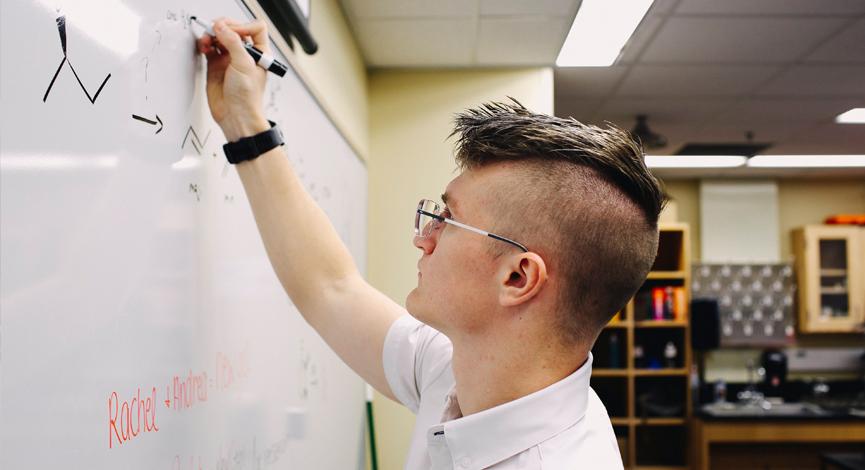
Heidelberg University is a community, a family, comprised of as many personalities as there are people. With our “5 Things to Know” blog, you’ll get to know some of them. You’ll learn about their Heidelberg experience and other informative, fun – even quirky – anecdotes. Together, they tell the Heidelberg story.
Kevin Scrudders likes the way chemistry looks at the world. “It’s just more concrete,” says the senior who’s currently deciding among several Ph.D. programs. He also likes the Heidelberg environment: inviting, friendly, small, more personal. The two worlds collided five years ago for Kevin, who’s made his mark as president of the Chemistry Club and has had great learning experiences with student research throughout his time as an undergrad here.
The professor connection
Instantly, Kevin hit it off with his Heidelberg chemistry professor and mentor, Dr. Nate Beres. Ironically, the two graduated from the same high school in Cambridge, Ohio, and learned the chemistry ropes from a really tough teacher, Nancy Vandyne. Dr. Beres sets similarly high standards for his students in a difficult field and “he treats us as equals,” which Kevin appreciates.
Full buffet of chemistry
Each year, the top ‘Berg chemistry students travel to the national American Chemical Society conference. Every discipline is represented – even some students haven’t heard of. “I was overwhelmed the first time and didn’t know the impact the conference would have,” says Kevin, who’s traveled to Denver, San Diego, San Francisco, New Orleans and Orlando in early April. “It really has opened my eyes to the possibilities that chemistry offers,” Kevin says, adding that organic chemistry is the field that “really piqued my interest.” When you segue that into biology, you get the best of worlds – biological chemistry – the direction he’ll likely pursue in grad school.
Research toward healing
Kevin really got his feet wet his sophomore year when he and a fellow student researched the anti-microbial properties of essential oils and attempted to determine if they could make a compound that would kill bacteria more effectively. As a senior, he’s developed that project further with new syntheses and a refined way to test how the new compounds stack up against other antibiotics. He’s also assisting fellow biochem major Amanda Sugrue experiment with electrospinning to make a patch that helps heal wounds. “Making something that could potentially help people is very important to me.” Kevin likes the ownership he has over his research and feels Heidelberg has prepared him with the necessary skill set to do well in grad school.
A good night’s sleep
In 2016, Kevin suffered a broken femur and a broken foot (opposite legs) in a car crash that forced him out of commission for several months. He was confined to bed for 30 days as he recovered at home. “After that, I didn’t really like beds,” he says. So he sleeps on the floor in a sleeping bad. “I just don’t like the softness of a mattress. And it’s better for my back.”
Scientific study of himself
You wouldn’t expect it, but Kevin is a procrastinator. So to keep himself accountable, he meticulously keeps track of everything he does, every minute of every day, for the past 2-1/2 years. “In a scientific way, I guess I’m doing a study of myself,” he says. He divides his activities into 42 categories and records his time using a wristwatch that is always running.